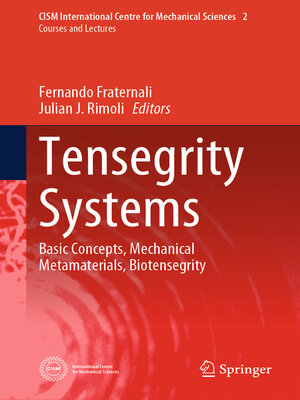Tensegrity Systems
ebook ∣ Basic Concepts, Mechanical Metamaterials, Biotensegrity · CISM International Centre for Mechanical Sciences
By Fernando Fraternali

Sign up to save your library
With an OverDrive account, you can save your favorite libraries for at-a-glance information about availability. Find out more about OverDrive accounts.
Find this title in Libby, the library reading app by OverDrive.



Search for a digital library with this title
Title found at these libraries:
| Library Name | Distance |
|---|---|
| Loading... |
This book illustrates the unique mechanical behaviors of tensegrity systems and their applications in mechanical metamaterials, space structures, and biomechanical models. It demonstrates that by controlling the mechanical response of tensegrity structures through internal and external prestress, it is possible to adjust the speed of mechanical waves within these systems, creating tunable bandgap structures. Furthermore, the geometrically nonlinear response exhibited by several tensegrity systems allows for the support of either compression or rarefaction solitary wave dynamics. These behaviors can be effectively utilized to design novel devices capable of focusing mechanical waves in narrow regions of space, as well as innovative impact protection systems.
After an introduction to the basic concepts and calculation methods for tensegrity systems and their minimal-mass design, the chapters explore the metamaterial behaviors of tensegrity systems associated with bandgap and solitary wave dynamics; present a mechanical model of flexible tensegrities, illustrating how harnessing the buckling of bars in such systems can result in structures with exceptional energy absorption capabilities, suitable for applications such as planetary landers or lattice metamaterials; and discuss the extreme mechanical behaviors achievable in tensegrity-inspired lattice structures exhibiting both soft and stiff deformation modes. The last chapters address the multifaceted field of biotensegrity, and provide an overview of current rapid prototyping techniques for tensegrity systems, along with a discussion of open questions and research opportunities in the field.







